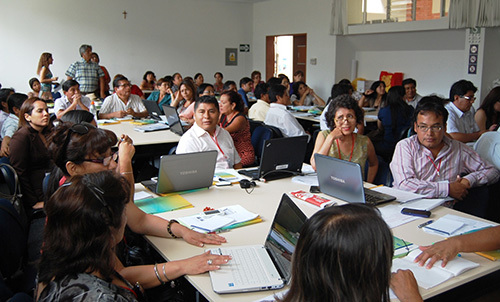
傑瑞Lavonen, 科學教育的教授和系主任赫爾辛基大學, 芬蘭, will be speaking about teacher education in Finland with a particular focus on teacher effectiveness and professionalism at the Oppi Festival in Helsinki this week (四月 11 和 12).
Finland has a reputation for excellence in education in terms of both high quality and equal opportunities for all. 故, organizing a global learning festival in Helsinki designed for teachers and educators to celebrate best practices in education, and bringing together 90 of the world’s leading experts from 18 不同國家, makes a lot of sense, 權?
That’s the hope of the organizers. The goal is that this festival will be the first in a series of international festivals in different countries for many years to come. The festival will offer workshops, presentations and discussions on the most recent themes in education, and feature top international thought leaders, including Sarah Brown, 菅米特拉, 托尼·瓦格納, 帕西SAHLBERG, Krista Kiuru and many other well-known voices from the world of education, which we are used to featuring in 全球搜索教育.
I recently caught up with Jari while he was leading a teaching training workshop in Lima, 秘魯.

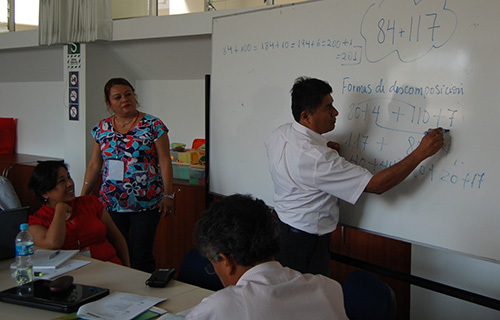
Tell me about your recent workshop in Lima. What are the goals?
The overall aim of the workshop has been to help Peruvian education experts plan a professional development program for mentors (accompañantes pedagógicos) in Peruvian school districts to support Peruvian teachers. Professors from the University of Helsinki and the Catholic University of Peru are working together on this. In our first meeting, we have given special attention to the issues related to the training process of mentors and the indirect influence on school teachers. A special emphasis of the development program is on teaching and learning mathematics and science, as well as on cultural diversity.
What are some of the key strategies you shared related to science teaching and learning?
I was focused on professional development and, moreover, 意見, classification and inquiry as teaching and learning methods in primary science. These methods were discussed from a learning and motivation point of view. I gave talks about curriculum and assessment. I emphasized in my presentations that teachers in Finland are academic professionals who are able to plan broadly, including developing a local curriculum and assessing their own teaching and students’ 學習. Countries around the world have undertaken reforms to prepare children for the demands of life and skills needed in the 21st century. There is no single strategy that can solve all the problems we face in education. 所以, a teacher should be able to make decisions on teaching strategies based on his/her group of students, research based knowledge on teaching, learning and motivation, and the local curriculum.

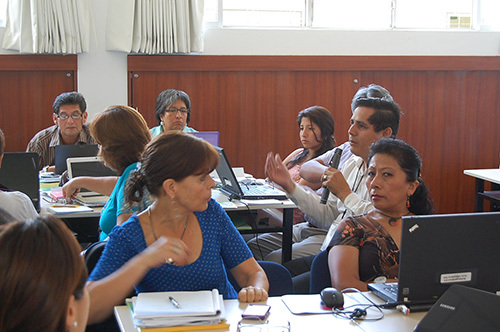
一般來說, what do you believe are the key competencies teachers need to effectively teach those skills?
在我看來, this question should be approached from the school and teaching situation point of view. The school should support the learning of 21st century skills. 在學校, 頂, teachers and pupils need to be committed to work as developers, aiming to develop teaching, learning and collaboration at that school. Physical and technology environments as well as collaboration with families and society should be supportive for the development of those skills at school. 21世紀 “運動” refers to the redefining of the goals of education and how learning is organized in order to meet the demands of the 21st century. 21st century individuals need both critical and creative thinking and should be able to: use a wide range of tools, like socio-cultural (語言) and technological tools (education technology or ICT) for interacting effectively with the environment; engage and interact in a heterogeneous group; and take responsibility for managing their own lives and acting autonomously. 然而, choosing the teaching/learning methods is not straightforward because students come from very diverse backgrounds. 因此,, it is important to utilize a variety of teaching methods which engage students in tackling the topic to be learned in such a way that they create meaningful and understandable knowledge structures that are based on the learning. This type of meaningful learning is grounded on activity and intention, reflection and self-evaluation, collaboration and interaction, construction, contextualization, and cumulative learning.
How do you guide teachers’ 和學校’ use of technology as an effective teaching tool?
The Finnish Ministry of Education has published national-level strategies for education and use of technology in education, and the National Board of Education has designed a national framework curriculum for the school level for supporting the planning of local curriculum and use of technology in education. Education units (例如. 學校和大學) 創建基於國家戰略自己的戰略和方案. 這種類型的基於策略的方法已在課程的工作,在學校教育中使用的技術的實施得到了應用. 有三個正式的國家戰略和若干國家發展項目在教育技術的運用,在過去 25 歲月. Strategic planning and implementation in the Finnish context has been based on the idea of autonomous decision making at the school level. Universities and further education institutes have organized training focused on the use of technology in education. 然而, many politicians and researchers are not satisfied with the current situation. It is still a challenge to encourage teachers to adopt the use of technology as part of their teaching and for them to appreciate the usefulness of technology in the science classroom. There is currently a lot of discussion in Finland on the use of technology in the education and preparation of teachers.

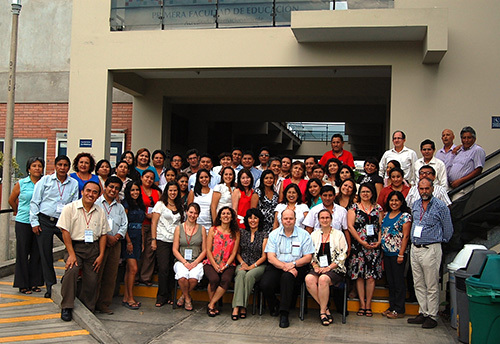
Do you see the role of the Finnish teachers changing as online learning evolves?
In many schools, there are good facilities and teachers are competent using technology, flexible learning approaches or distance learning. There is a lot of research in this area. 然而, there is also variation in competencies of teachers and facilities. 因此,, an integrated approach to develop technology use in education is needed, meaning not only investment in technology infrastructure, like mobile devices, platforms, social media and cloud-services, but also short and long-term in-service-training for teachers, supporting the pedagogical use of technology infrastructure in the classroom. The politicians are perhaps too optimistic about the use of technology. 在我看來, it is more important to internalize the ideas of meaningful learning and motivational aspects of learning. Meaningful learning is grounded on activity and intention, reflection and self-evaluation, collaboration and interaction, construction, contextualization, and cumulative learning. Central to motivation are basic psychological needs: the need for autonomy, the need for competencies, and the need for relatedness (need to belong to a group). In addition to learning and motivation, several other pedagogical views are important, like integration and inclusion of personalized learning. 當然,, the versatile use of technology could support student learning and motivation. Finnish schools are good at networking with families and other parties in society. We have had research projects where we have recognized that different kinds of networking foster the integration of technology into education, such as co-operation among schools; among teachers, developers and researchers; and among schools and their environment or working life. Networking is needed at all levels: inside school, between schools, and moreover, at national and international levels.
有關OPPI節的更多信息: http://oppifestival.com/

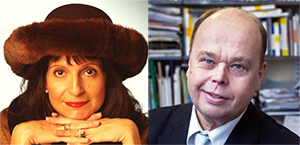
All photos are courtesy of Jari Lavonen.
在全球搜索教育, 和我一樣,全球知名的思想領袖,包括邁克爾·巴伯爵士 (英國), 博士. 邁克爾座 (美國), 博士. 萊昂特司特因 (美國), 克萊克里斯坦森教授 (美國), 博士. 琳達·達林 - 哈蒙德 (美國), 博士. 馬達夫恰範 (印度), 邁克爾·富蘭教授 (加拿大), 霍華德·加德納教授 (美國), 安迪·哈格里夫斯教授 (美國), 伊馮娜赫爾曼教授 (荷蘭), 克里斯汀Helstad教授 (挪威), 讓·亨德里克森 (美國), 玫瑰Hipkins教授 (新西蘭), 科妮莉亞Hoogland教授 (加拿大), 這位傑夫·約翰遜 (加拿大), 太太. 尚塔爾考夫曼 (比利時), 博士. Eija Kauppinen (芬蘭), 國務秘書塔皮奧Kosunen (芬蘭), 多米尼克·拉方丹教授 (比利時), 休·勞德教授 (英國), 本·萊文教授 (加拿大), 主肯麥克唐納 (英國), 巴里McGaw教授 (澳大利亞), 希夫納達爾 (印度), Ř教授. 納塔拉詹 (印度), 博士. 吳PAK (新加坡), 博士. 丹尼斯教皇 (美國), 斯瑞達拉賈戈帕蘭 (印度), 博士. 黛安·拉維奇 (美國), 理查德·威爾遜·賴利 (美國), 肯·羅賓遜爵士 (英國), 帕西SAHLBERG教授 (芬蘭), 押尾佐藤教授 (日本), 安德烈亞斯·施萊歇 (PISA, 經合組織), 博士. 安東尼·塞爾頓 (英國), 博士. 大衛·謝弗 (美國), 博士. 基爾斯滕都沉浸式 (挪威), 總理斯蒂芬·SPAHN (美國), 伊夫Theze (法國公立高中美國), 查爾斯Ungerleider教授 (加拿大), 托尼·瓦格納教授 (美國), 大衛·沃森爵士 (英國), 迪倫Wiliam教授 (英國), 博士. 馬克沃莫爾德 (英國), 西奧Wubbels教授 (荷蘭), 邁克爾·楊教授 (英國), 和張民選教授 (中國) 因為他們探索所有國家今天面臨的大畫面的教育問題. 全球搜索教育社區頁面
ç. M. 魯賓是兩個廣為傳誦的在線系列,她接受了筆者 2011 厄普頓·辛克萊獎, “全球搜索教育” 和 “我們將如何閱讀?” 她也是三本暢銷書, 其中 真正的愛麗絲夢遊仙境, 並且是發行 CMRubinWorld.
按照ç. M. 魯賓在Twitter: www.twitter.com/@cmrubinworld


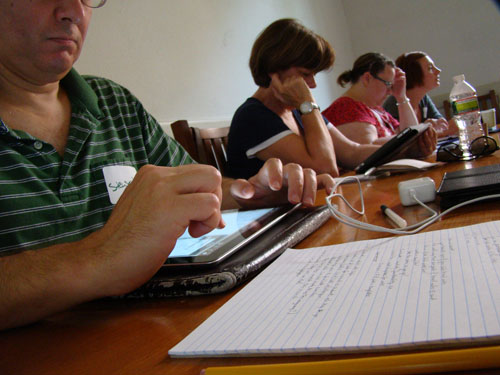
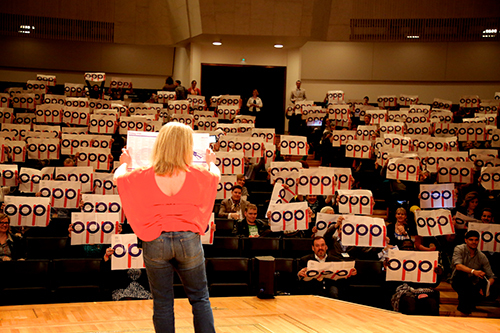
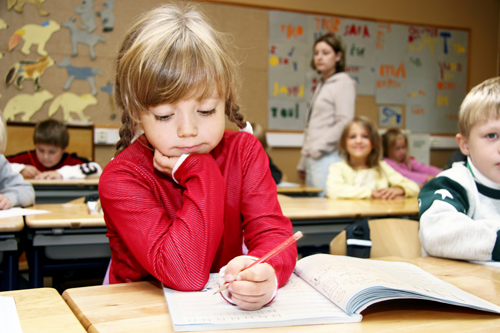
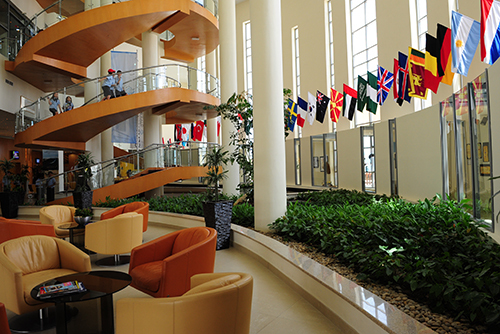
最新評論